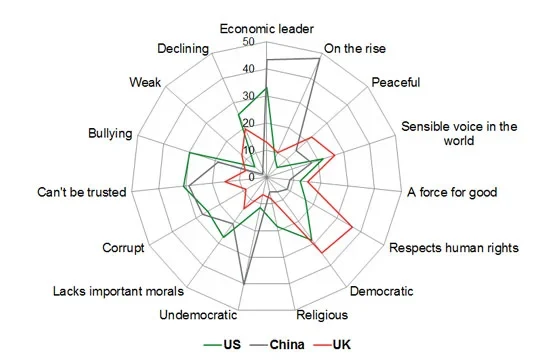If hard power equals coercion or payment, then soft power, as Harvard’s Joseph Nye has suggested, reflects an ability to persuade and influence through attraction or respect towards what you are, what you do and what you represent in aspirational terms.
Britain’s historic hard power status seems to have all but gone. According to a major cross-country study by YouGov-Cambridge, however, Britain arguably ranks among the ‘soft power superpowers’ of the 21st Century.
The survey, completed in August 2012, included nationally representative samples in the US, Britain, France and Germany, plus a pan-regional sample in the Middle East and North Africa, and a sample of the online population in Pakistan and China. The results found Britain is widely valued as a peaceful, respectful, sensible voice in the world, with ‘respect for human rights’ and ‘democratic’ actually chosen as the top two views of Britain overall.
Britons see their country as significantly weaker and more in decline than other countries see it. 40% of Brits see the country as ‘declining’ compared to only 16% of those in the US, Germany, France and Pakistan. Generally only around 10% in these countries describe Britain as weak.
By contrast, perceptions of America are broadly negative, with leading associations including ‘can’t be trusted’, ‘bullying’, and ‘lacks important morals’. The two leading associations are ‘economic leader’ (33%) and ‘democratic’ (28%). Only 13% call the US ‘a force for good’, while 25% call it ‘declining’, and ‘corrupt’. However, America still scores highly in a list of eighteen countries as somewhere desirable to live, coming second in this survey behind Australia amongst the Brits, French, German and Chinese, slipping to fourth across MENA and fifth for Pakistani respondents.
China’s top three associations across the samples are ‘on the rise’ (48%), ‘economic leader’ (44%) and ‘undemocratic’ (40%), and the country is widely expected by respondents to overtake the US as the world’s leading superpower in 20 years’ time. But if China scores highly as a perceived hard power, it also has what Nye calls a ‘soft power deficit’. Relatively high scores are consistently seen across all survey countries except Pakistan for ‘corrupt’, ‘can’t be trusted’ and ‘lacks important morals’.
Britain’s soft power further comes through in how it is seen alongside the US as the preferred destination to go for education. It also suffers from a ‘trust deficit’ in the MENA region, however, where associations for ‘can’t be trusted’ are raised. So while there is a strong story for British soft power overall, there is clearly work to be done on Britain’s image in the region.
Figure 1: Cross-country comparison of attitudes to US, China and Britain (average US, MENAP, FR, Britain)

Source: YouGov-Cambridge cross-country poll, 10th-25th August, Sample size: various




